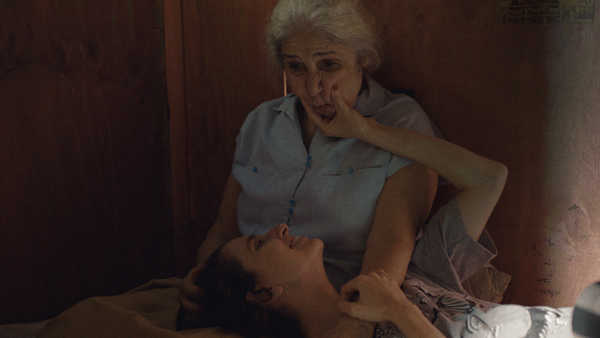A Streetcar Named Desejo: Freire Mines Matriarchal Tendencies
Having directed several short films and television series, Brazilian director Pedro Freire unleashes a motherlode of intergenerational dysfunctions with his feature narrative debut, the captivating Malu. We learn in the end credits the film is based on the experiences of the director’s mother, actress Malu Rocha, who passed away in 2013 due to prion disease. Freire pays agonizing homage to his mother, an actress in her fifties, living in squalor in a crumbling coastal facade in 1990s Rio de Janeiro.
An intergenerational portrait of three women begin to take shape as Malu insistently lives in the memories of her glory days while navigating dysfunctional relationships with her mother and daughter. Violent outbursts and impassioned fury engulf her, with leading star Yara de Novaes taking on the dimensions of a tragic Tennessee Williams heroine. A mixture of sadness and madness define this painful chapter of a headstrong woman who has a penchant for burning bridges but gloriously extolling her beliefs and values, though ultimately to her detriment.
Malu (Yara de Novaes) lives with her elderly mother Lili (Juliana Carneiro da Cunha) in a dilapidated family home. Technically in the slums of Rio, Malu retains all the gusto of a star in her prime, which allows her the overbearing ability to combat her judgmental mother. Living on the premises is the much younger, queer friend of Malu’s, Tibira (Atila Bee), who supplies them with an endless supply of marijuana, much to Lili’s chagrin. When Malu’s daughter Joana (Carol Duarte) arrives for a visit, she urges her mother to ask for assistance, as she’s unable to pay for repairs to the home, which is still technically in her father’s name. But Malu is resistant to making any changes whatsoever, refusing to entertain the thought of repairs unless the property is legally signed over to her. Instead, she fantasizes about returning to her craft, but based on everything around her, this appears to be a pipe dream.

There’s something of Norma Desmond apparent in Malu’s demeanor, a woman defined solely by her delusion. If Grey Gardens (1975) comes to mind in her living situation with her conservative mother, so does Joao Canijo’s recent masterpiece Bad Living (2023), wherein a similarly dysfunctional, irreparably enmeshed family of women are trapped together in a fading Portuguese luxury hotel, their love metamorphosing into resentment and hate.
We meet Malu doing vocal exercises, spouting lines from Hamlet, though quickly it seems for no real reason other than for her own entertainment. Her tranquil life seems peaceful until her mother Lili invites a local priest over to speak with Malu. A somewhat pleasant conversation veers chaotically into a show stopping confrontation as Malu insists Jesus was a communist, asserting he was a messiah who started a religion full of pedophiles. Devolving into a physical altercation between mother and daughter the likes of which haven’t been realized since Isabelle Huppert and Annie Girardot tortured one another in Haneke’s The Piano Teacher (2001), Lili finds herself banished to one of the various ill kept sheds on the property Malu thinks she’s going to rent out for extra income.
Cue the arrival of prodigal daughter Joana (Carol Duarte of Ainouz’s Invisible Life, 2019), a journalist who’s fled to Sao Paulo. Once again, mother and daughter seem to have a pleasant relationship until Malu’s behavior instigates a major blow out, wherein we get a sense of the rebellious anti-establishment behavior which made her into an over the top, absent parent. As we listen to the exchanges between these women, Freire’s script utilizes every moment to convey their worldviews which find them continually locked in opposition. Lili, who tends to patches of disparate flowers, comments on how they have to ‘suffer for beauty,’ whilst needling Malu endlessly. “You’re not a pretty woman. An actress who’s not pretty complicates things,” she sniffs during one of Malu’s fantasies about resuming her career.
Like A Streetcar Named Desire had we cut out Stanley Kowalski to focus on the emotional weaponry of women as they prepare themselves for the madhouse, the film is continually frustrating as we witness their inability to properly care for one another. With Lili ending up on the street after she maliciously tampers with Tibiria’s mairjuana, backfiring when Malu becomes ill, their lives suddenly descend into a maelstrom. While it would seem Freire’s film is sometimes a poison pen letter, it’s really a thorny but loving portrait of a vibrant woman suffocated by the rebellion which likely assisted her previous glory. Ending with a diagnosis of prion disease, explaining her declining mental and physical health, Freire leaves us wanting more of his fascinating subject and her brazen vibrancy.
Reviewed on January 21st at the 2024 Sundance Film Festival – World Cinema Dramatic Competition section. 103 mins.
★★★½/☆☆☆☆☆


